|
|
|
Sort Order |
|
|
|
Items / Page
|
|
|
|
|
|
|
| Srl | Item |
| 1 |
ID:
186322
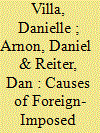

|
|
|
|
|
| Summary/Abstract |
Why do major powers attempt foreign-imposed regime change (FIRC)? This article builds on existing security theory, proposing that a major power looks for signals that a government might exit that major power’s international hierarchy and/or enter an adversary’s hierarchy. Major powers are more likely to attempt FIRC against states that signal shifting preferences. The article tests the theory on American FIRC attempts from 1947 to 1989, covert and overt, failed and successful, proposing that when a hierarchy member or neutral state engaged in economic expropriation, this signaled possible exit from the US hierarchy and/or entry into the Soviet hierarchy, making a US FIRC attempt against that state more likely. It also presents an alternative theory, that economic special interests drove US FIRC attempts. Using new data on expropriations, the article supports the security theory, as expropriations by US hierarchy members made FIRC attempts more likely, but does not support the special interests theory.
|
|
|
|
|
|
|
|
|
|
|
|
|
|
|
|
| 2 |
ID:
186331


|
|
|
|
|
| Summary/Abstract |
This article introduces the Commercial Military Actor Database (CMAD), a dataset able to support research on civil war and commercial military actors. First, the CMAD covers all civil wars from 1980 to 2016 across all of the world’s regions except Europe, which enables the investigation of long-term regional and global trends. Second, the CMAD encompasses the corporate market segment and mercenary outfits, which facilitates the analysis of how those actors have impacted conflicts differently. Third, containing detailed information about the relationships behind exchanges, the CMAD allows users to disaggregate market exchanges. Using the CMAD’s new data, we examined trends in the market for force, and demonstrate the data’s added value. We re-examining Akcinaroglu and Radziszewski’s study on how private military and security companies affect the duration of civil war. The findings show that the market’s influence on conflict can only be fully understood by including corporate and mercenary actors.
|
|
|
|
|
|
|
|
|
|
|
|
|
|
|
|
| 3 |
ID:
186328
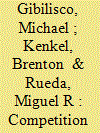

|
|
|
|
|
| Summary/Abstract |
Violence against civilians in civil war is widely thought of as a strategic choice by combatant groups. We argue that a common strategic logic of competition underlies diverse theories of civilian victimization. We develop a theory of strategic complements in victimization, hypothesizing that an armed group’s propensity to victimize civilians will increase with its expectation that its competitors will act likewise. We test this argument by structurally estimating a formal model of strategic interdependence between armed groups using data from the Colombian civil war. Our findings indicate that strategic expectations are responsible for a substantial amount of violence against civilians: the two major combatant groups would have systematically victimized civilians in at least 9% fewer municipalities if they had expected no violence by their rival. Examining causal mechanisms, we also find that victimization in the Colombian case was more likely aimed at controlling civilians than at influencing peace negotiations.
|
|
|
|
|
|
|
|
|
|
|
|
|
|
|
|
| 4 |
ID:
186327
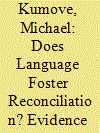

|
|
|
|
|
| Summary/Abstract |
Despite a surge in research on post-conflict reconciliation, the specific factors which promote reconciliation remain a subject of debate. In particular, the possible role of shared language in fostering reconciliation has received little scholarly attention. This paper examines two possible channels through which shared language may facilitate reconciliation, and tests these using a new survey dataset of 446 individuals from Serbia. As expected, the results indicated that shared language reduces the negative effect of conflict on intergroup trust and friendship, two crucial components of reconciliation. Furthermore, the results suggest that in the former Yugoslavia this effect is generated by the communication-enabling aspects of a shared language, rather than its other properties such as acting as a marker of ethnic or cultural identity.
|
|
|
|
|
|
|
|
|
|
|
|
|
|
|
|
| 5 |
ID:
186330
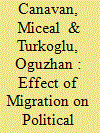

|
|
|
|
|
| Summary/Abstract |
In recent years, a record number of people have been forcibly displaced or migrated due to conflict. Whilst established political science research suggests that displaced communities are an added risk factor for conflict due to their support for extreme co-ethnic political parties and movements, this has been challenged by recent research which shows that migrants can be a moderating force. We offer a potential reconciliation of these divergent findings by distinguishing between first- and second-generation migrants. Due to their relative lack of conflict exposure, second-generation migrants will have significantly less support for co-ethnic political parties than first-generation migrants and those who remain. We test our argument using granular survey data comparing Kurds who migrated out of the conflict zone in Turkey with those who remained. The results support our theoretical framework and have important implications for our understanding of migrant attitudes and the long-term effects of conflict exposure.
|
|
|
|
|
|
|
|
|
|
|
|
|
|
|
|
| 6 |
ID:
186329
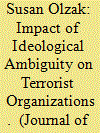

|
|
|
|
|
| Summary/Abstract |
Organizations that have a clear and unambiguous focus acquire greater legitimacy, which raises their capacity for mobilization. Using data on terrorist organizations, this paper explores two empirical implications of this claim: A terrorist organization’s survival and lethality will be threatened to the extent that it has an ambiguous ideological identity. Analyses using panel data from the Extended Data on Terrorist Groups (EDTG) test these arguments for 474 global terrorist organizations observed over 1970–2016. The key empirical predictions are that ambiguity inhibits lethality and curtails survival. This paper finds support for these claims, controlling for competition from rivals and allies, ethno-nationalist or Islamic ideological orientation, and a variety of other measures of organizational capacity.
|
|
|
|
|
|
|
|
|
|
|
|
|
|
|
|
| 7 |
ID:
186326
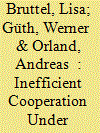

|
|
|
|
|
| Summary/Abstract |
Stochastic uncertainty can cause coordination problems that may hinder mutually beneficial cooperation. We propose a mechanism of ex-post voluntary transfers designed to circumvent these coordination problems and ask whether it can increase efficiency. To test this transfer mechanism, we implement a controlled laboratory experiment based on a repeated Ultimatum Game with a stochastic endowment. Contrary to our hypothesis, we find that allowing voluntary transfers does not lead to an efficiency increase. We suggest and analyze two major reasons for this failure: first, stochastic uncertainty forces proposers intending to cooperate to accept high strategic uncertainty, which many proposers avoid; second, many responders behave only incompletely conditionally cooperatively, which hinders cooperation in future periods.
|
|
|
|
|
|
|
|
|
|
|
|
|
|
|
|
| 8 |
ID:
186332
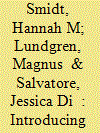

|
|
|
|
|
| Summary/Abstract |
Research on UN peacekeeping operations has established that operations' size and composition affect peacekeeping success. However, we lack systematic data for evaluating whether variation in tasks assigned to UN peacekeeping mandates matters and what explains different configurations of mandated tasks in the first place. Drawing on UN Security Council resolutions that establish, extend, or revise mandates of 27 UN peacekeeping operations in Africa in the 1991–2017 period, the Peacekeeping Mandates (PEMA) dataset fills this gap. It records 41 distinct tasks, ranging from disarmament to reconciliation and electoral support. For each task, the PEMA dataset also distinguishes between three modalities of engagement (monitoring, assisting, and securing) and whether the task is requested or merely encouraged. To illustrate the usefulness of our data, we re-examine Hultman, Kathman, and Shannon’s (2013) analysis of operations’ ability to protect civilians. Our results show that host governments and rebel groups respond differently to civilian protection mandates.
|
|
|
|
|
|
|
|
|
|
|
|
|
|
|
|
| 9 |
ID:
186320
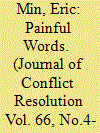

|
|
|
|
|
| Summary/Abstract |
How does battlefield activity affect belligerents’ behavior during wartime negotiations? While scholars have studied when and why warring parties choose to negotiate, few insights explain what negotiators do once seated at the table. I argue that actors engage in obstinate negotiation behavior to signal resolve when undergoing contentious and indeterminate hostilities. I explore this claim by analyzing all negotiation transcripts and associated daily military operations reports from the Korean War. Using text-based, machine learning, and statistical methods, I show that high levels of movement or casualties in isolation produce clear information on future trends, thus yielding more substantive negotiations, while more turbulent activity featuring high movement and casualties in tandem produces cynical negotiations. Moving past contemporary literature, this study explores micro-level dynamics of conflict and diplomacy, builds a theoretical bridge between two perennial views of negotiation, and provides a framework for studying war by applying computational methods to archival documents.
|
|
|
|
|
|
|
|
|
|
|
|
|
|
|
|
| 10 |
ID:
186325


|
|
|
|
|
| Summary/Abstract |
Why does the military in some countries get involved in the economy by running profit-making enterprises and what leads governments to permit such involvement? Running household appliance factories, transportation agencies, banks, hotels, etc., are indeed unrelated to national security and are far removed from the regular roles assigned to militaries. Such involvement has further implications for both politics and the economy. I argue that the process of military involvement in the economy functions as a survival strategy for leaders and a profit-making scheme for the military. Using original cross-national data on the emergence of military involvement in the economy, this research demonstrates that militaries are more likely to get involved in the economy when the military’s institutional interests are at risk and when the government has to rely on the military to maintain power. Leaders allow the military to benefit financially through economic activities in order to stay in power.
|
|
|
|
|
|
|
|
|
|
|
|
|
|
|
|
| 11 |
ID:
186321


|
|
|
|
|
| Summary/Abstract |
Civilian control of the military is central to the making of security policy, ensuring that civilian officials and the elected leaders that appoint them oversee and decide military affairs. This paper exposes a challenge to civilian control in the United States that originates in the disparaging attitudes military personnel hold toward civilian society. We argue that when military personnel view military culture as superior, they are more likely to view civilian political leaders as illegitimate and in turn to favor actions that undermine civilian control. We develop a typology of civilian control in which military officers can constrain, contest and limit civilian authority. Our empirical analysis provides strong and consistent evidence of the corrosive effects of military superiority on civilian control across three surveys of U.S. military personnel: the 1998-99 TISS survey of 2901 military officers, a 2014 YouGov of 275 veterans, and an original 2020 survey of 770 West Point cadets.
|
|
|
|
|
|
|
|
|
|
|
|
|
|
|
|
| 12 |
ID:
186323


|
|
|
|
|
| Summary/Abstract |
Prominent research holds that the use of weapons of mass destruction is taboo. But how strong are these norms? Investigating this question among the mass public, we argue that some citizens actually support taboo policies in private but are unwilling to express counter-normative opinions openly due to fear of social sanction. These insincere norm-holders are difficult to identify empirically because they are observationally equivalent to sincere norm-holders in direct-question surveys. To overcome this challenge, we use a list design, which allows survey respondents to indirectly express sensitive opinions. The results from three list experiments show that between 10% and 17% of Americans falsify their preferences over chemical weapons use when asked directly. In an extension, we explore our framework in the realm of nuclear weapons and elite behavior. Our findings advance a specific debate on the strength of weapons taboos, while our conceptualization of insincere norm-holders and methodological application have broader implications for how scholars might think about and measure norms in international politics.
|
|
|
|
|
|
|
|
|
|
|
|
|
|
|
|
| 13 |
ID:
186324
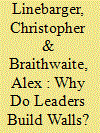

|
|
|
|
|
| Summary/Abstract |
States around the world are fortifying their international borders at unprecedented rates. While only seven states had fortified their borders with walls or fences as of the end of World War Two, this number has now grown to more than 75. Why do states build walls on their international borders? While states may build walls to ameliorate the consequences of cross-border economic inequalities and to defend against transnational security threats, we suggest that another compelling logic stems from domestic politics and leaders’ desire to remain in office. Building on assumptions furnished by diversionary theory, we argue that national political leaders at risk of losing office are incentivized to implement popular policies, such as border wall construction, hoping that doing so will prompt a domestic rally effect. To test this argument, we assemble a global dataset of leader-years and find that politically insecure leaders are more likely to be seen to start and continue border wall construction.
|
|
|
|
|
|
|
|
|
|
|
|
|
|
|
|
|
|
|
|
|